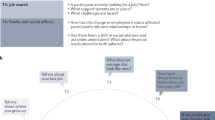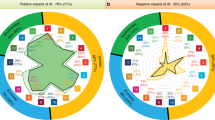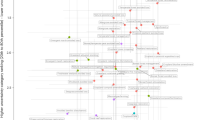Abstract
In order to effectively adapt to climate change, public officials and other stakeholders need to rapidly enhance their understanding of local risks and their ability to collaboratively and adaptively respond to them. We argue that science-based role-play simulation exercises — a type of 'serious game' involving face-to-face mock decision-making — have considerable potential as education and engagement tools for enhancing readiness to adapt. Prior research suggests role-play simulations and other serious games can foster public learning and encourage collective action in public policy-making contexts. However, the effectiveness of such exercises in the context of climate change adaptation education and engagement has heretofore been underexplored. We share results from two research projects that demonstrate the effectiveness of role-play simulations in cultivating climate change adaptation literacy, enhancing collaborative capacity and facilitating social learning. Based on our findings, we suggest such exercises should be more widely embraced as part of adaptation professionals' education and engagement toolkits.
This is a preview of subscription content, access via your institution
Access options
Subscribe to this journal
Receive 12 print issues and online access
$209.00 per year
only $17.42 per issue
Buy this article
- Purchase on Springer Link
- Instant access to full article PDF
Prices may be subject to local taxes which are calculated during checkout
Similar content being viewed by others
References
IPCC Climate Change 2014: Impacts, Adaptation and Vulnerability Part A: Global and Sectoral Aspects (eds Field, C. et al.) (Cambridge Univ. Press, 2014).
Geurts, J. L. A., Duke, R. & Vermeulen, P. A. M. Policy gaming for strategy and change. Long Range Plann. 40, 535–558 (2007).
Brewer, G. D. Scientific gaming: the development and use of free-form scenarios. Simulat. Gaming 9, 309–338 (1978).
Haug, C., Hujtema, D. & Wenzler, I. Learning through games? Evaluating the learning effect of a policy exercise on European climate policy. Technol. Forecast. Soc. Change 78, 968–981 (2011).
Mayer, I. S. The gaming of policy and the politics of gaming: a review. Simulat. Gaming 40, 825–862 (2009).
Mayer, I. et al. The research and evaluation of serious games: toward a comprehensive methodology. Br. J. Educ. Technol. 45, 502–527 (2014).
Parson, E. A. Informing global environmental policy-making: a plea for new methods of assessment and synthesis. Environ. Model. Assess. 2, 267–279 (1997).
Birkmann, J., Garschagen, M., Kraas, F. & Nguyen, Q. Adaptive urban governance: new challenges for the second generation of urban adaptation strategies to climate change. Sustain. Sci. 5, 185–206 (2010).
Hallegatte, S., Green, C., Nicholls, R. J. & Corfee-Morlot, J. Future flood losses in major coastal cities. Nature Clim. Change 3, 802–806 (2013).
Lemos, M. C., Kirchhoff, C. J. & Ramprasad, V. Narrowing the climate information usability gap. Nature Clim. Change 2, 789–794 (2012).
Susskind, L., Rumore, D., Hulet, C. & Field, P. Managing Climate Change Risks in Coastal Communities: Strategies for Engagement, Readiness, and Adaptation (Anthem, 2015).
Amundsen, H., Berglund, F. & Westskog, H. Overcoming barriers to climate change adaptation — a question of multilevel governance? Environ. Plann. C 28, 276–289 (2010).
Anguelovski, I. & Carmin, J. Something borrowed, everything new: innovation and institutionalization in urban climate governance. Curr. Opin. Environ. Sustain. 3, 169–175 (2011).
Biesbroek, R., Klostermann, J., Termeer, C. & Kabat, P. Barriers to climate change adaptation in the Netherlands. Clim. Law 2, 181–199 (2011).
Measham, T. G. et al. Adapting to climate change through local municipal planning: barriers and challenges. Mitig. Adapt. Strat. Glob. Change 16, 889–909 (2011).
Moser, S. C. & Ekstrom, J. A. A framework to diagnose barriers to climate change adaptation. Proc. Natl Acad. Sci. USA 107, 22026–22031 (2010).
Rittel, H. & Webber, M. Dilemmas in a general theory of planning. Policy Sci. 4, 155–169 (1973).
Moser, S. C. & Boykoff, M. T. in Successful Adaptation to Climate Change: Linking Science and Policy in a Rapidly Changing World (eds Moser, S. C. & Boykoff, M. T.) 1–34 (Routledge, 2013).
Collins, K. & Ison, R. Jumping off Arnstein's ladder: social learning as a new policy paradigm for climate change adaptation. Environ. Policy Gov. 19, 358–373 (2009).
Adger, W. N. et al. in Climate Change 2007: Impacts, Adaptation and Vulnerability (eds Parry, M. L., Canziani, O. F., Palutikof, J. P., van der Linden, P. J. & Hanson, C. E.) 717–743 (IPCC, Cambridge Univ. Press, 2007); http://www.resalliance.org/index.php?id=9835&sr=1
Ford, J. D., Berrang-Ford, L. & Paterson, J. A systematic review of observed climate change adaptation in developed nations. Climatic Change 106, 327–336 (2011).
Adapting to the Impacts of Climate Change (National Research Council, 2010).
Susskind, L. Responding to the risks posed by climate change: cities have no choice but to adapt. Town Plan. Rev. 81, 217–235 (2010).
Reed, M. et al. What is social learning? Ecol. Soc. 15, r1 (2010).
Pahl-Wostl, C. & Hare, M. Processes of social learning in integrated resources management. J. Commun. Appl. Soc. Psychol. 206, 193–206 (2004).
Innes, J. & Booher, D. Planning with Complexity: An Introduction to Collaborative Rationality for Public Policy (Random House, 2010).
Innes, J. & Booher, D. Consensus building as role playing and bricolage: toward a theory of collaborative planning. J. Am. Plann. Assoc. 65, 9–26 (1999).
Wu, J. S. & Lee, J. J. Climate change games as tools for education and engagement. Nature Clim. Change 5, 413–418 (2015).
Mendler de Suarez, J. et al. Games for a New Climate: Experiencing the Complexity of Future Risks. Pardee Center Task Force Report (Boston University, 2012).
Informing an Effective Response to Climate Change (National Research Council, 2010).
Jones, L., Ludi, E., Beautement, P., Broenner, C. & Bachofen, C. New Approaches to Promote Flexible and Forward-Looking Decision Making: Insights From Complexity Science, Climate Change Adaptation and 'Serious Gaming' (Africa Climate Change Resilience Alliance, 2013).
Abt, C. C. Serious Games (University Press of America, 2002).
Dolin, E. J. & Susskind, L. E. A role for simulations in public policy disputes: the case of national energy policy. Simulat. Gaming 23, 20–44 (1992).
Parson, E. A. in Wise Choices: Decisions, Games and Negotiations (Zeckhauser, R. J., Keeney, R. L. & Sebenius, J. K.) Ch. 14 (Harvard Business School Press, 1996).
DeNeve, K. M. & Heppner, M. J. Role play simulations: the assessment of an active learning technique and comparisons with traditional lectures. Innov. High. Educ. 21, 231–246 (1997).
Susskind, L. & Corburn, J. Using Simulations to Teach Negotiation: Pedagogical Theory and Practice Working Paper 99-1 (Program on Negotiation at Harvard Law School, 1999).
Najam, A. Getting Beyond the Lowest Common Denominator: Developing Countries in Global Environmental Negotiations (Massachusetts Institute of Technology, 2001).
Mayer, I. S. The gaming of policy and the politics of gaming: a review. Simulat. Gaming 40, 825–862 (2009).
Grüne-Yanoff, T. & Weirich, P. The philosophy and epistemology of simulation: a review. Simulat. Gaming 41, 20–50 (2010).
Schenk, T. & Susskind, L. in Action Research for Climate Change Adaptation: Developing and Applying Knowledge for Governance (van Buuren, A., Eshuis, J. & van Vliet, M.) Ch. 9 (Routledge, 2014).
Susskind, L. & Rumore, D. Collective climate adaptation: can games make a difference? Solut. J. 4, 5–9 (2013).
Schenk, T. in Infranomics: Sustainability, Engineering, Design and Governance (eds Gheorghe, A. V., Masera, M. & Katina, P. F.) 239–255 (Springer, 2014).
Gordon, E., Schirra, S. & Hollander, J. Immersive planning: a conceptual model for designing public participation with new technologies. Environ. Plann. B 38, 505–519 (2011).
Yee, N. & Bailenson, J. Walk a mile in digital shoes: the impact of embodied perspective-taking on the reduction of negative stereotyping in immersive virtual environments. In PRESENCE 2006: 9th Annu. Int. Work. Presence (International Society for Presence Research, 2006).
Stokes, L. C. & Selin, N. E. The mercury game: evaluating a negotiation simulation that teaches students about science-policy interactions. J. Environ. Stud. Sci. http://dx.doi.org/10.1007/s13412-014-0183-y (2014).
Crookall, D. Serious games, debriefing, and simulation/gaming as a discipline. Simulat. Gaming 41, 898–920 (2011).
Rumore, D. Building the capacity of coastal communities to adapt to climate change through participatory action research: lessons learned from the New England Climate Adaptation Project. Carolina Plann. J. 39, 16–23 (2014).
Susskind, L. & Paul, E. Winning public support for addressing climate change. Solut. J. 1, 44–48 (2010).
World Resources Report 2010–2011: Decision Making in a Changing Climate — Adaptation Challenges and Choices (World Resources Institute, 2011).
Leiserowitz, A., Maibach, E. W., Roser-Renouf, C. & Smith, N. Global Warming's Six Americas, May 2011 (Yale Project on Climate Change Communication, 2011); http://sciencepolicy.colorado.edu/students/envs3100/maibach2011.pdf
Next Generation Planner (Tygron, 2016); http://www.tygron.com
Poplin, A. Digital serious game for urban planning: “B3 — design your marketplace!” Environ. Plann. B 41, 493–511 (2014).
Acknowledgements
The New England Climate Adaptation Project was supported with funding from the University of New Hampshire and the National Oceanic and Atmospheric Administration under Cooperative Agreement no. NA09NOS4190153 (CFDA no. 11.419). The IUP received support from the Dutch Knowledge for Climate Program, funded through TNO; the Program on Negotiation at Harvard Law School; and the Tufts-MIT Water Diplomacy Program. The authors also wish to acknowledge all of the NECAP research team members, partners, and workshop participants who made the project possible, as well as Ellen Czaika for her help in statistically analysing NECAP data. They also wish to thank the incredible local partners and participants in the three case cities in the IUP, and in particular project partners at TNO.
Author information
Authors and Affiliations
Contributions
D.R. conceptualized the research questions and analysed data for NECAP. T.S. conceptualized the research questions and analysed data for Institutionalizing Uncertainty. L.S. provided mentoring and oversight for both projects. D.R. and T.S. contributed equally to the preparation of this manuscript, with input from L.S.
Corresponding author
Ethics declarations
Competing interests
The authors declare no competing financial interests.
Supplementary information
Supplementary Information
Supplementary Figures and Table (PDF 765 kb)
Rights and permissions
About this article
Cite this article
Rumore, D., Schenk, T. & Susskind, L. Role-play simulations for climate change adaptation education and engagement. Nature Clim Change 6, 745–750 (2016). https://doi.org/10.1038/nclimate3084
Received:
Accepted:
Published:
Issue Date:
DOI: https://doi.org/10.1038/nclimate3084
This article is cited by
-
Essential but challenging climate change education in the Global South
Nature Climate Change (2023)
-
Beyond Just Talking Strategy: Using Gaming Simulations to Catalyze Airline Managers’ Buy-in to Novel Strategies that Can Shape or Adapt to Profit Cyclicality
Systemic Practice and Action Research (2023)
-
Organizations, Learning, and Sustainability: A Cross-Disciplinary Review and Research Agenda
Journal of Business Ethics (2023)
-
Learning impacts of policy games: investigating role-play simulations (RPS) for stakeholder engagement in payment for hydrological services program in Veracruz, Mexico
Socio-Ecological Practice Research (2022)
-
Marae-opoly: supporting localised Māori climate adaptation decisions with serious games in Aotearoa New Zealand
Sustainability Science (2022)



